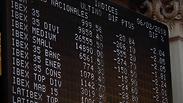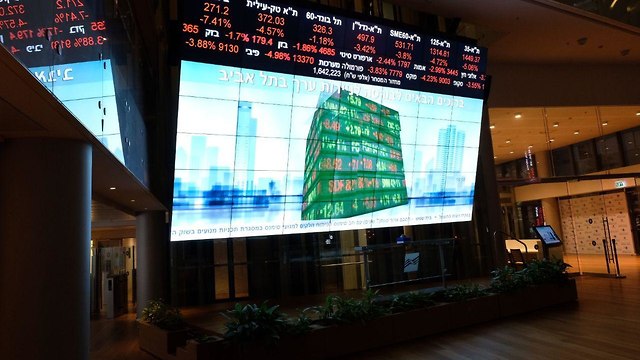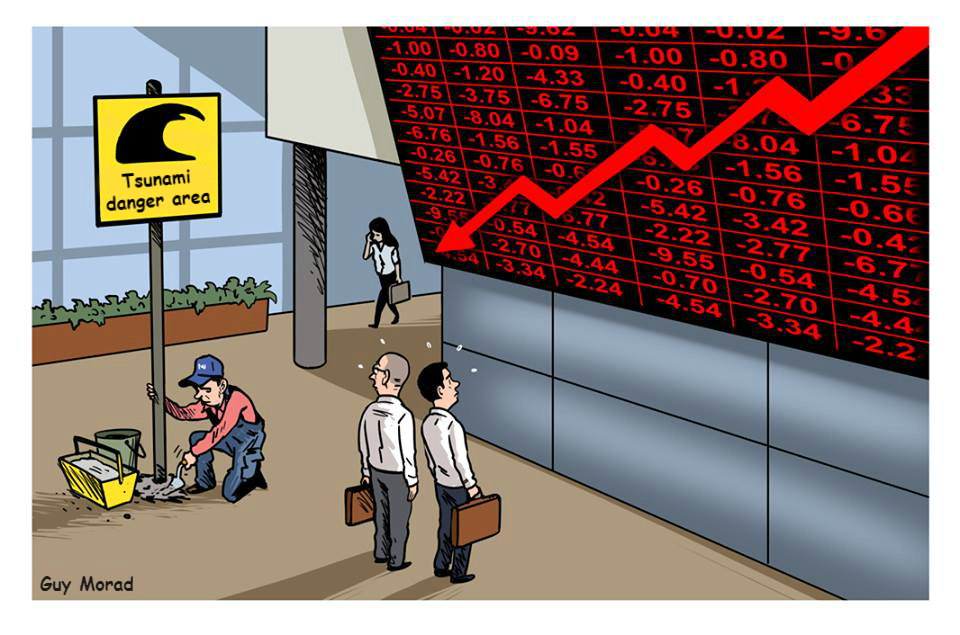
Tel Aviv Stock Exchange opens with a wobble
TASE fluctuates in the wake of Wall Street's biggest weekly drop in years; although main indicies have dropped, experts do not anticipate a serious market crash; PM Netanyahu: 'I am certain we will overcome the current turmoil.'
Tel Aviv Stock Exchange (TASE) opened with a wobble Monday, as stocks rose briefly and dropped soon after. The recent market fluctuations have come in the wake of US stock market's biggest weekly drop in years.
After the US Stock Exchange dropped over the weekend, experts anticipated a subsequent drop in TASE as well. But no one expected the fall to be so great: on Sunday, Israeli stocks plummeted sharply in the biggest decline registered in the past seven years.
On Monday, TASE opened for trading with a brief rise: the TA-35 index went up 0.6%, and the TA-125 rose by 0.5%. However, after an hour of relative calm, declines were registered across the board. Among the stocks that fell were Shufersal and Harel Group which dropped 1.5% each, and Paz Oil Company Ltd. and Israel Discount Bank Ltd. were down 1.3%.
The downturn is influenced by a global trend, particularly the huge losses on Wall Street. The US Stock Exchange was in panic on Sunday as the Dow Jones 500 Index plummeted 18%, the Dow Jones Industrial Average dropped 16%, the Nasdaq was down 22%; and shares in FAANG (Facebook, Apple, Amazon, Netflix and Google) stocks lost $1.2 trillion.
According to experts, various factors contributed to this decline: public debt, the trade crisis with China, and the increase in public debt. In addition, according to a Wall Street Journal report, US President Donald Trump blamed Federal Reserve Chairman Jerome Powell—who has been raising interest rates despite the president's objections— for causing stock prices to drop with two successive central bank rate hikes.
Since the Israeli economy is realtively stable—the unemployment rate stands at about 4%, and the growth index stands at almost 3%—experts do not anticipate a serious market crash. Indeed, Prime Minister Benjamin Netanyahu, speaking at the inauguration of new Governor of the Bank of Israel, Prof. Amir Yaron said he was optimistic about Israel's economy.
"I think that the steps we have taken so far have helped us weather great storms and I would like to say I am certain that we will overcome the current turmoil in the capital markets, because the Israeli market generates value," he said.
According to the incoming Bank of Israel governor, the immediate challenge for the central bank is the “normalization” of monetary policy. “I view the interest rate as the main and most effective tool for directing monetary policy,” Yaron said moments after he was sworn in.
He noted that other important challenges include economic growth, productivity and fiscal policy.
“The Israeli economy and financial system are resilient and stable, but the markets volatility and declines in recent months, the possible end of the current business cycle, and the negative developments in world trade emphasize the importance of responsible fiscal conduct,” Yaron said.
Reuters contriubuted to this report.












